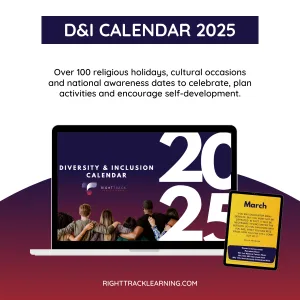Diversity and Inclusion Calendar Awareness Dates 2025
Benefits:
- Supports and promotes initiatives for diversity and inclusion.
- Enhances awareness and understanding of diversity
- Offers valuable information regarding important dates related to diversity and inclusion.

Diversity & Inclusion Calendar 2025
It’s essential to acknowledge the wide range of holidays, cultural events, religious observances, and awareness dates to create an inclusive working environment.
This calendar serves as a practical resource to strengthen your diversity and inclusion strategies, helping you build a thoughtful and effective action plan.
Download for December 2025 now, or if you’re looking for the 2026 Culture and Inclusion calendar to start planning the year ahead, click here.
DOWNLOAD CALENDARAll about the calendar...
Who will benefit from the Diversity & Inclusion Calendar?
Everyone can benefit from using a Diversity & Inclusion Calendar!
- Senior Management and HR Professionals: This calendar is a great tool for leadership and HR teams to ensure the organisation acknowledges and honours religious and cultural events. It also aids in planning meaningful activities for awareness days.
- Marketing Teams: It helps teams stay informed about key dates, which helps in planning relevant content and creating campaigns that reflect cultural sensitivity.
- Everyone: The calendar is a valuable resource for anyone looking to expand their awareness. Whether for personal development, educational purposes, or simply staying informed, it promotes inclusivity and cultural appreciation.
How do I use it?
Click the link to download the Calendar PDF, and it will automatically appear in your ‘Downloads’ folder. From there, you can save it to your desktop for easy access.
This calendar is a valuable planning tool designed to help you, and your team recognise important cultural dates throughout the year. It can be shared across your organisation to promote awareness, plan company events, or adjust schedules around significant observances. Consider including the calendar in your internal communications. For example, you could add the current months calendar page in your internal newsletter, put it on noticeboards, or share it during team meetings to ensure these dates are widely recognised.
Please note that the calendar is not a comprehensive list of all cultural and diversity related events, but it serves as an excellent starting point. All events included were accurate at the time of publication.
Diversity & Inclusion Calendar 2025
Explore the D&I Calendar and discover over 100 national awareness dates, religious holidays, and cultural events to celebrate, plan, and foster self-development.
Explore the Inclusion Perception Gap in your Organisation
Research suggests there is often misalignment between how leaders and the rest of the employee population perceive company culture. When leaders drive change based on their own experiences, and the lived experiences of their closest peers only, they are less likely to achieve desired results.
By inviting open and honest feedback from all employees through an anonymous survey, we can gauge how different groups of people experience the workplace with regards to five difference aspects of the organisational ecosystem. Data is compiled into a comprehensive report from which we draw meaningful insights for leaders to reflect on as part of the development journey.
There is no charge for the Culture Diagnostic, however, in order to collect a meaningful data set this option is only available to organisations where we can gather responses from >250 people.
We invite anonymous feedback from your people regarding five different aspects of your company culture:
- ‘Belonging’ – does your company culture foster a sense of inclusion for all people to thrive?
- ‘Role Models’ – do people managers have the skills to role model excellence and build exceptional teams?
- ‘Approach’ – is your vision and strategy clearly communicated and supported by the right policies, processes & data insights?
- ‘Values’ – are your workplace behaviours clearly defined and regularly reviewed through meaningful performance management?
- ‘Education’ – is there a strategy in place to continually develop and strengthen your people and teams?